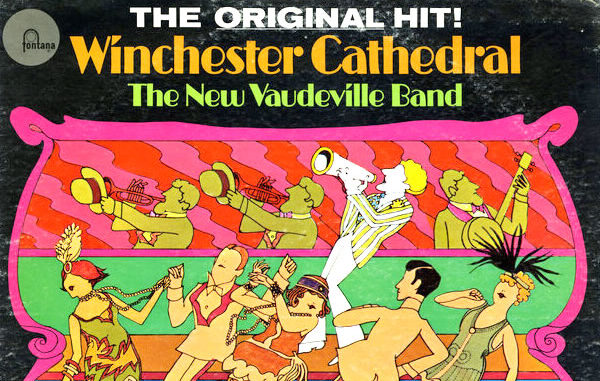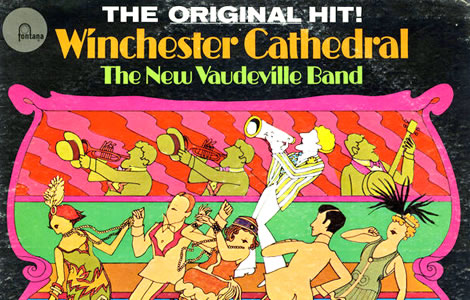
“Winchester Cathedral” by The New Vaudeville Band is a quintessential piece of 1960s pop music, capturing the whimsical charm and nostalgic feel of the era.

Released in 1966, the song quickly became a hit, resonating with audiences both in the UK and worldwide.
Behind the Act
The New Vaudeville Band was the brainchild of British singer and songwriter Geoff Stephens. Stephens, who had already made a name for himself as a successful songwriter, conceived the band and the song as a pastiche of the music hall style that was popular in the early 20th century.
The lead vocals on “Winchester Cathedral” were performed by John Carter, though he was not a permanent member of the band.
The distinctive vocal style, which mimicked the megaphone crooning of Rudy Vallée, was a deliberate attempt to evoke the sound of the 1920s and 1930s.
Stephens assembled a group of session musicians to record the song, but when it became a hit, he put together a touring version of The New Vaudeville Band to perform live.
This group included Alan Klein, Hughie Flint, and Neil Lancaster, among others. Despite the revolving lineup, the band managed to maintain the quirky, vintage sound that defined their music.
Meaning of the Lyrics
“Winchester Cathedral” is a playful lament of lost love, told from the perspective of someone addressing the cathedral as if it were a confidant.
The lyrics speak to the sorrow of a man who feels abandoned and betrayed by his lover, who “left him in the lurch.” The repeated refrain, “Winchester Cathedral, you’re bringing me down,” personifies the cathedral as a witness to his heartache.
The whimsical tone and catchy melody mask the melancholy subject matter, creating a juxtaposition that adds to the song’s charm.
UK Current Affairs in 1966
In 1966, the United Kingdom was undergoing significant social and political changes. Harold Wilson was the Prime Minister, leading the Labour Party.
His government was focused on modernising the British economy and society, tackling issues such as housing, education, and healthcare.
The year was marked by the implementation of progressive policies, but also by economic challenges, including a balance of payments crisis and debates over the value of the pound.
The cultural scene in the UK was vibrant, with the rise of the British Invasion in music, led by bands like The Beatles and The Rolling Stones.
1966 also saw England hosting and winning the FIFA World Cup, an event that significantly boosted national morale and pride.
US Current Affairs in 1966
Across the Atlantic, Lyndon B. Johnson was the President of the United States.
Johnson’s presidency was heavily influenced by the Vietnam War, which was escalating and becoming increasingly controversial.
Domestically, Johnson was pursuing his “Great Society” agenda, which aimed to eliminate poverty and racial injustice.
The Civil Rights Movement continued to make significant strides, although the country was also experiencing social unrest and division.
Success of the Single
“Winchester Cathedral” was released in October 1966 in the UK and quickly climbed the charts. It reached number 4 on the UK Singles Chart, showcasing its popularity among British listeners.
The song’s success was not confined to the UK; it resonated strongly with international audiences as well.
In the United States, “Winchester Cathedral” achieved even greater success. It reached number 1 on the Billboard Hot 100 chart in December 1966, marking a significant achievement for The New Vaudeville Band.
The song’s nostalgic style and catchy tune appealed to a wide audience, helping it stand out in a year dominated by rock and roll. The single also won the Grammy Award for Best Contemporary (R&R) Recording in 1967, cementing its place in music history.
Worldwide, “Winchester Cathedral” became a hit in several countries, reaching the top of the charts in Canada and Australia.
Its international success underscored the universal appeal of its retro sound and playful lyrics.
Lasting Legacy can be heard on Capitol fm
“Winchester Cathedral” remains a beloved classic from the 1960s, frequently played on oldies and easy-listening radio stations. Its enduring popularity can be attributed to its unique blend of nostalgia, catchy melody, and whimsical lyrics.
The song encapsulates a specific moment in musical history when artists were experimenting with different styles and sounds, often looking to the past for inspiration.
The New Vaudeville Band’s brief but impactful career is a testament to the creative spirit of the 1960s. Geoff Stephens’ vision for a band that celebrated the music hall tradition struck a chord with audiences around the world, proving that even in an era dominated by rock and roll, there was still a place for the charming and eccentric sounds of the past.
“Winchester Cathedral” stands as a delightful reminder of the eclectic nature of 1960s pop music, a song that continues to bring joy to listeners more than five decades after its release.
